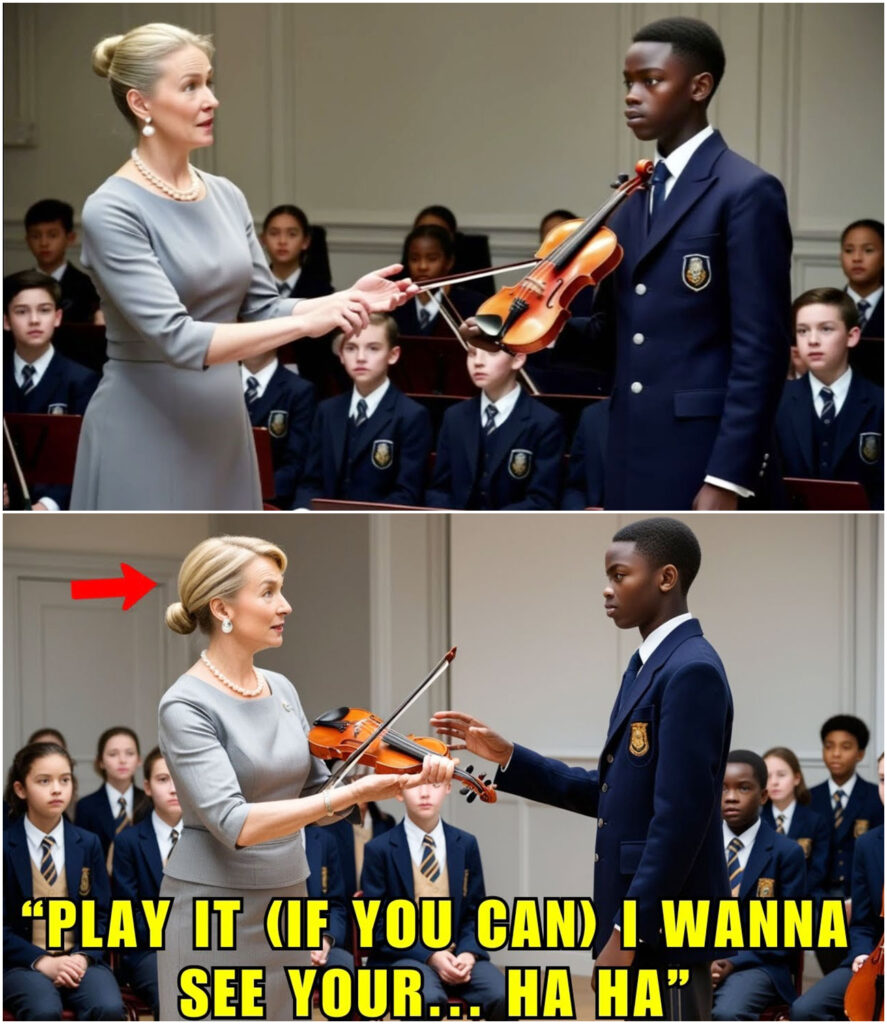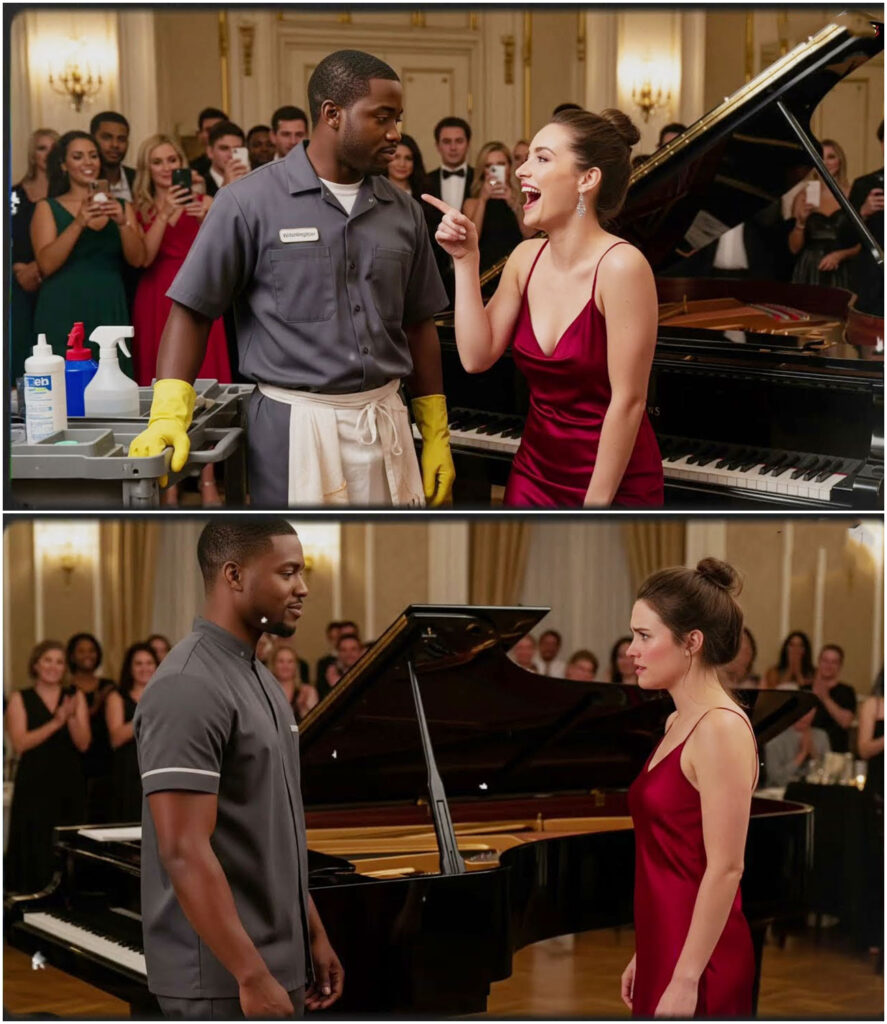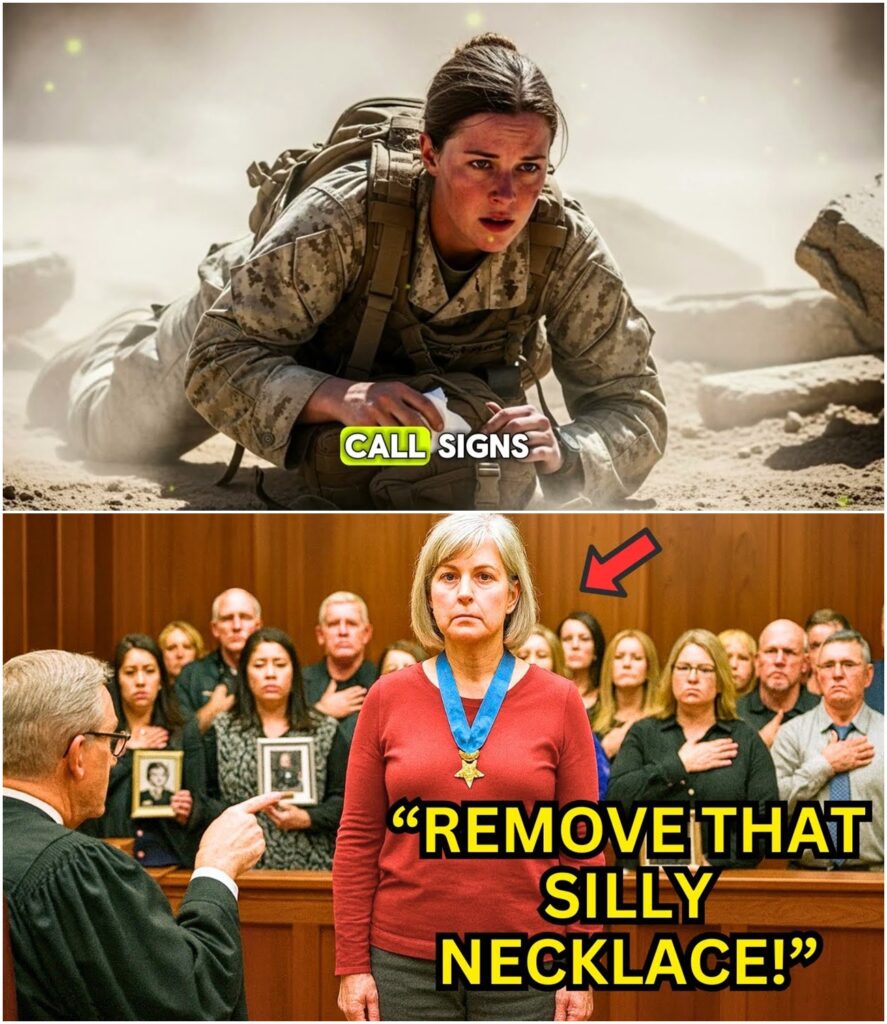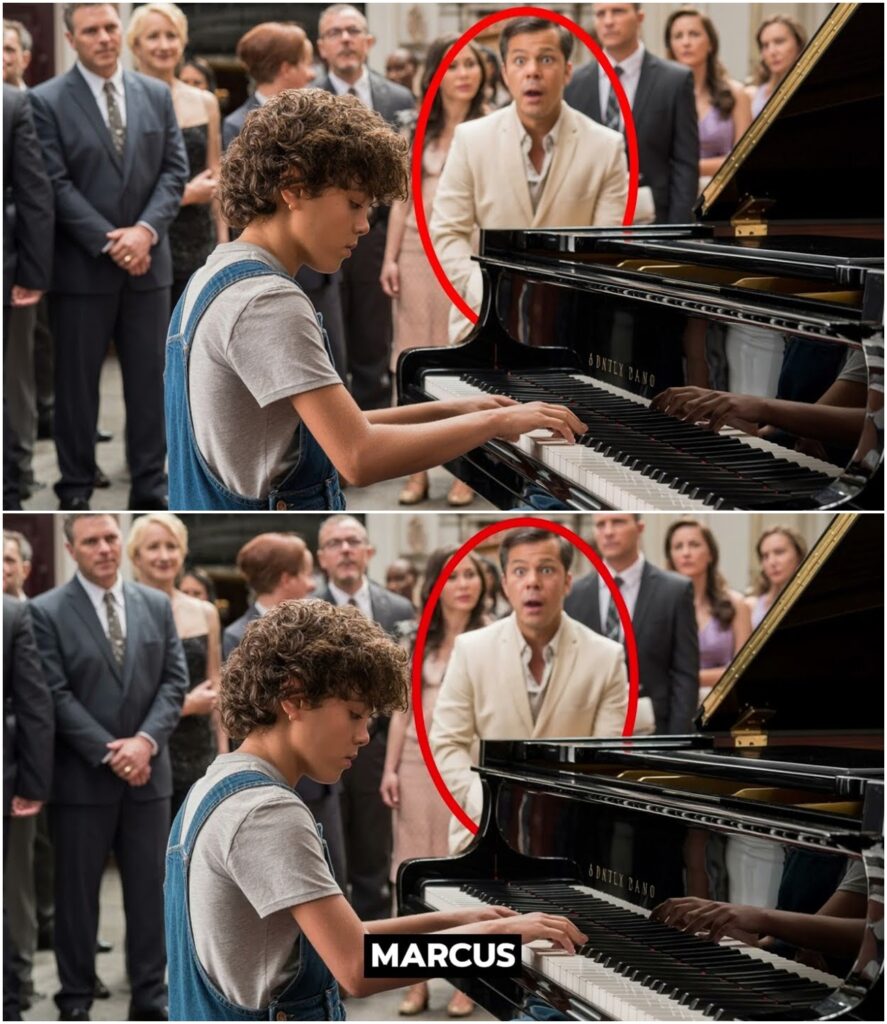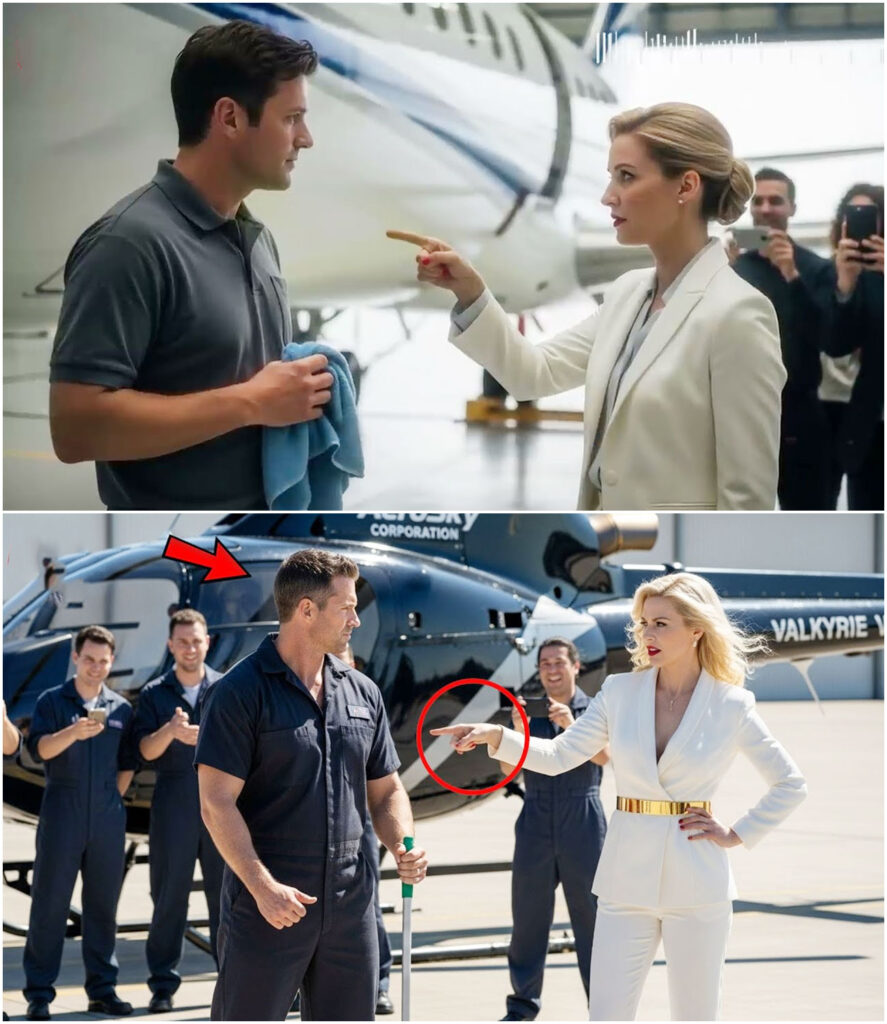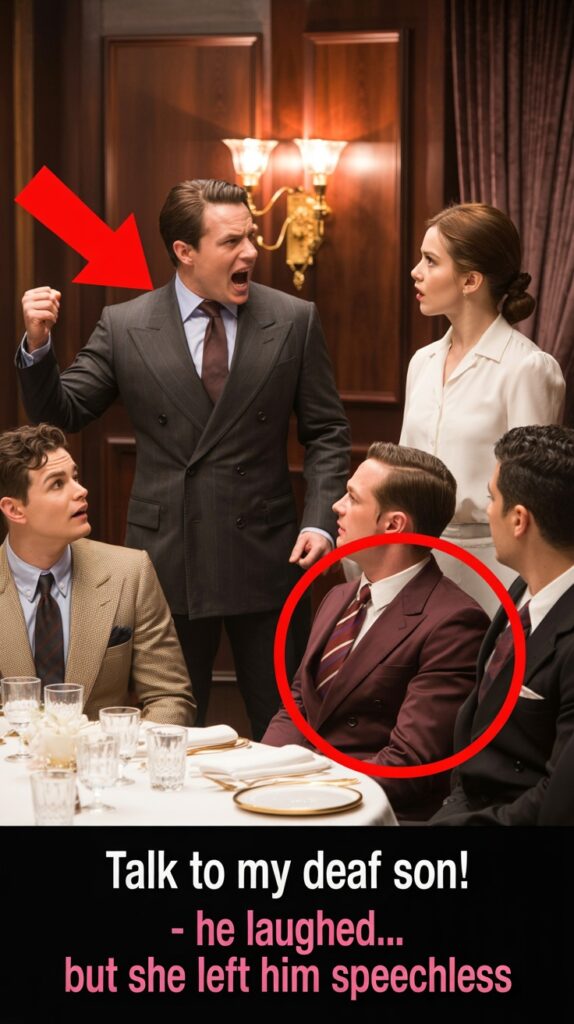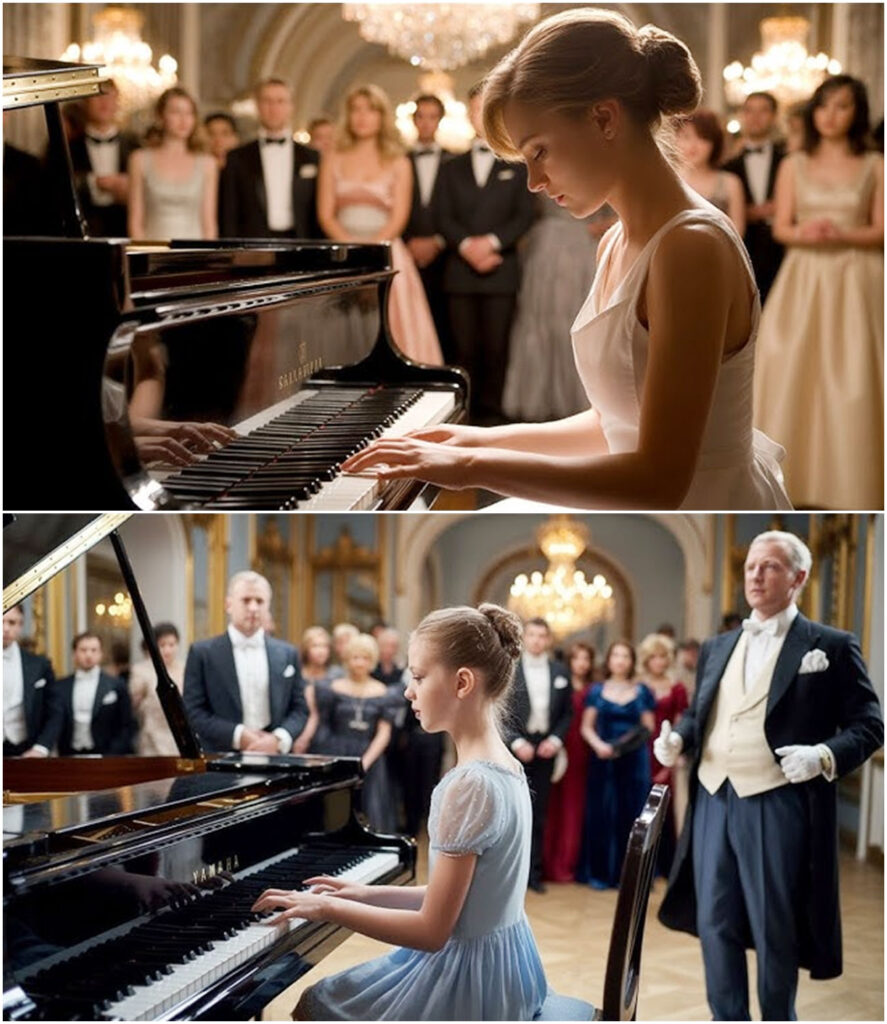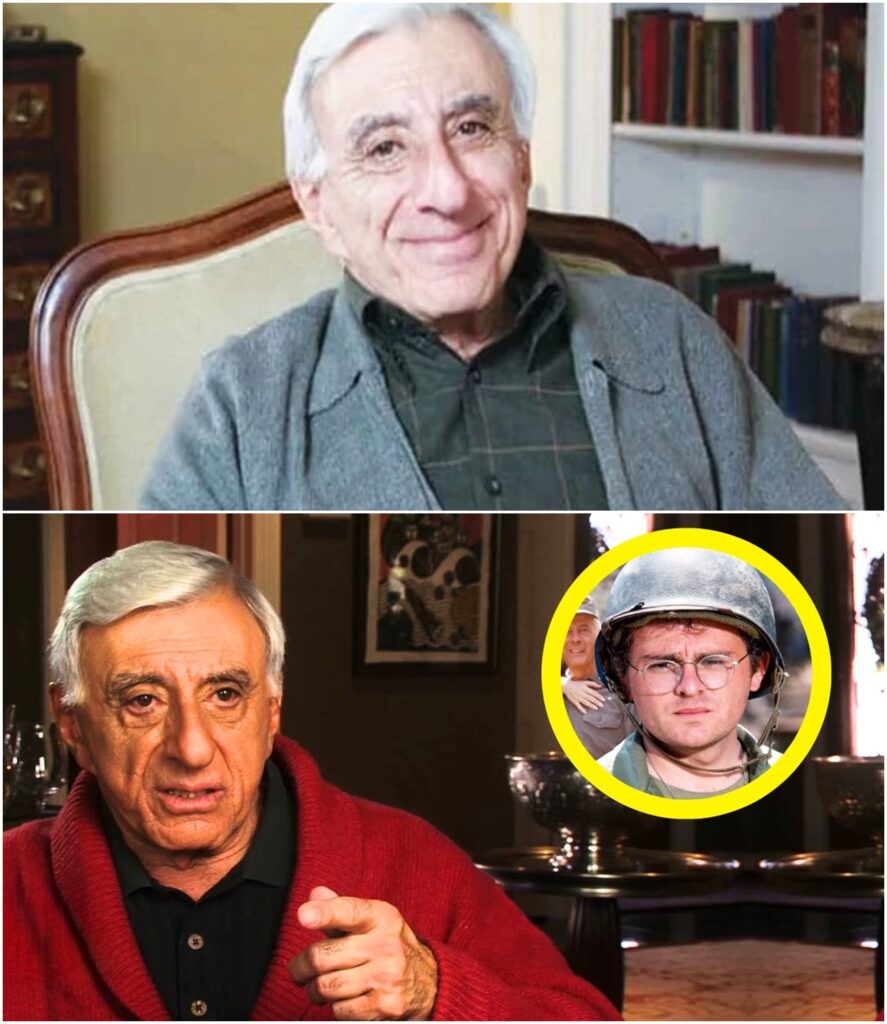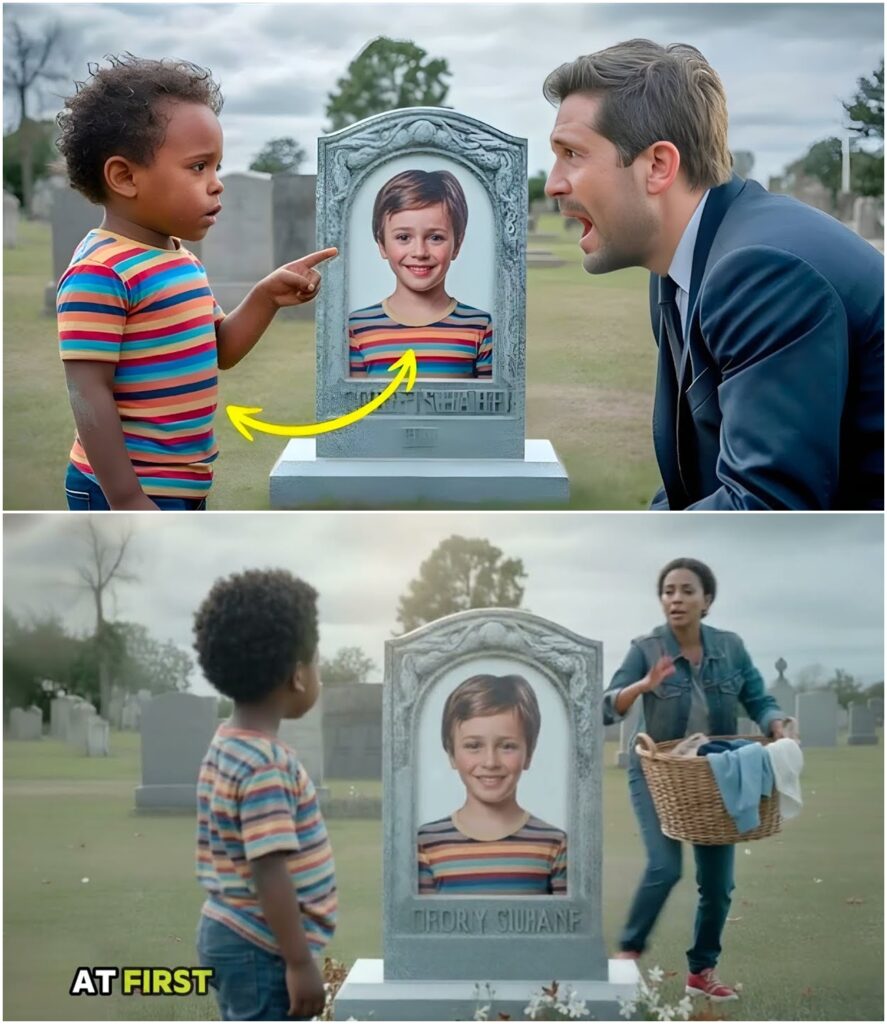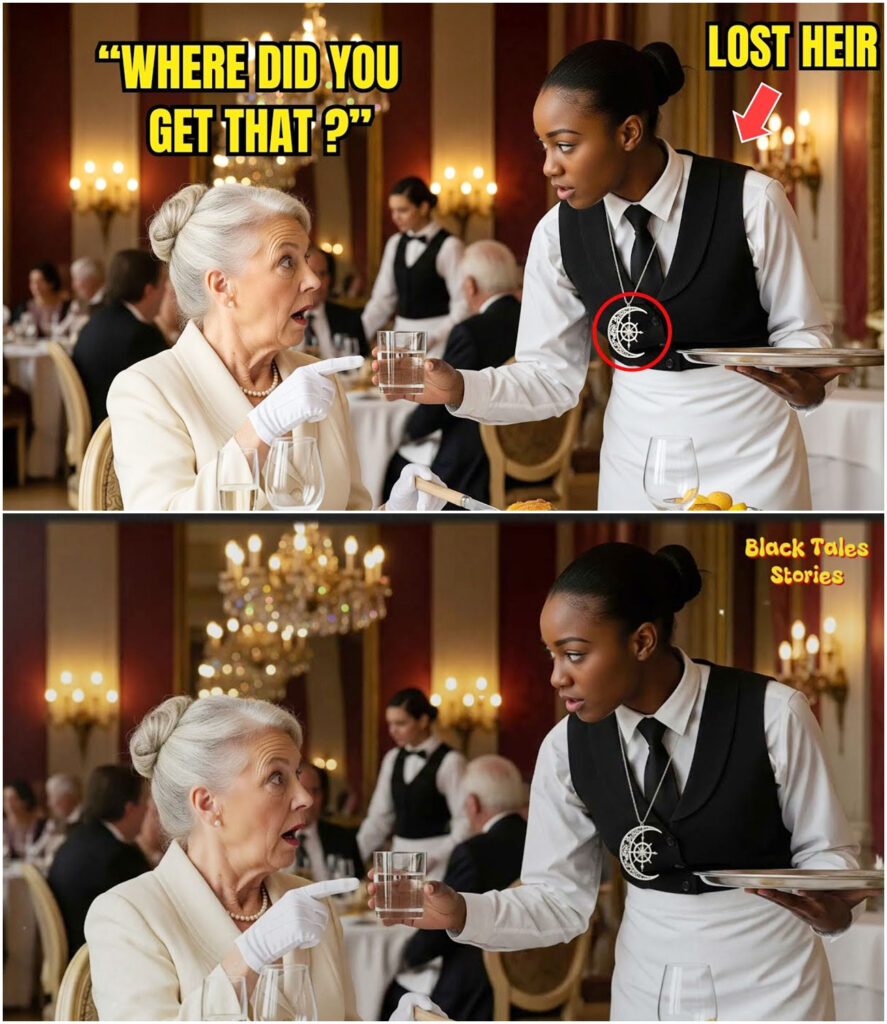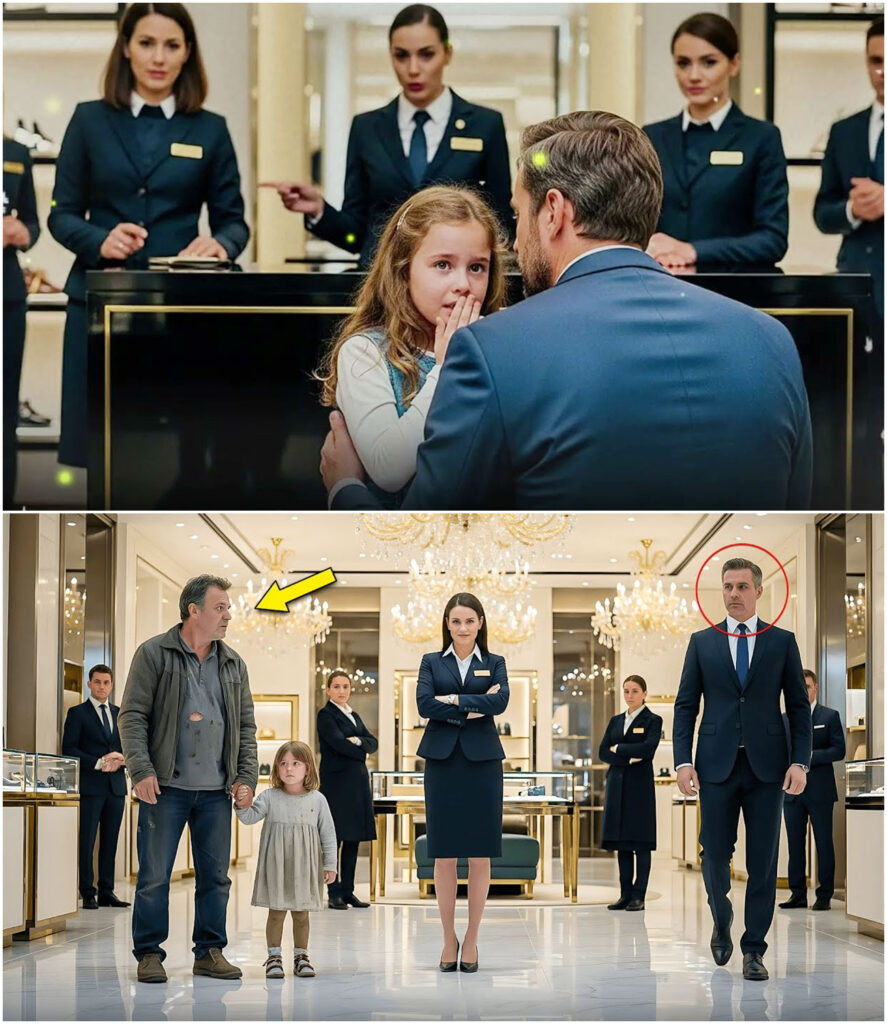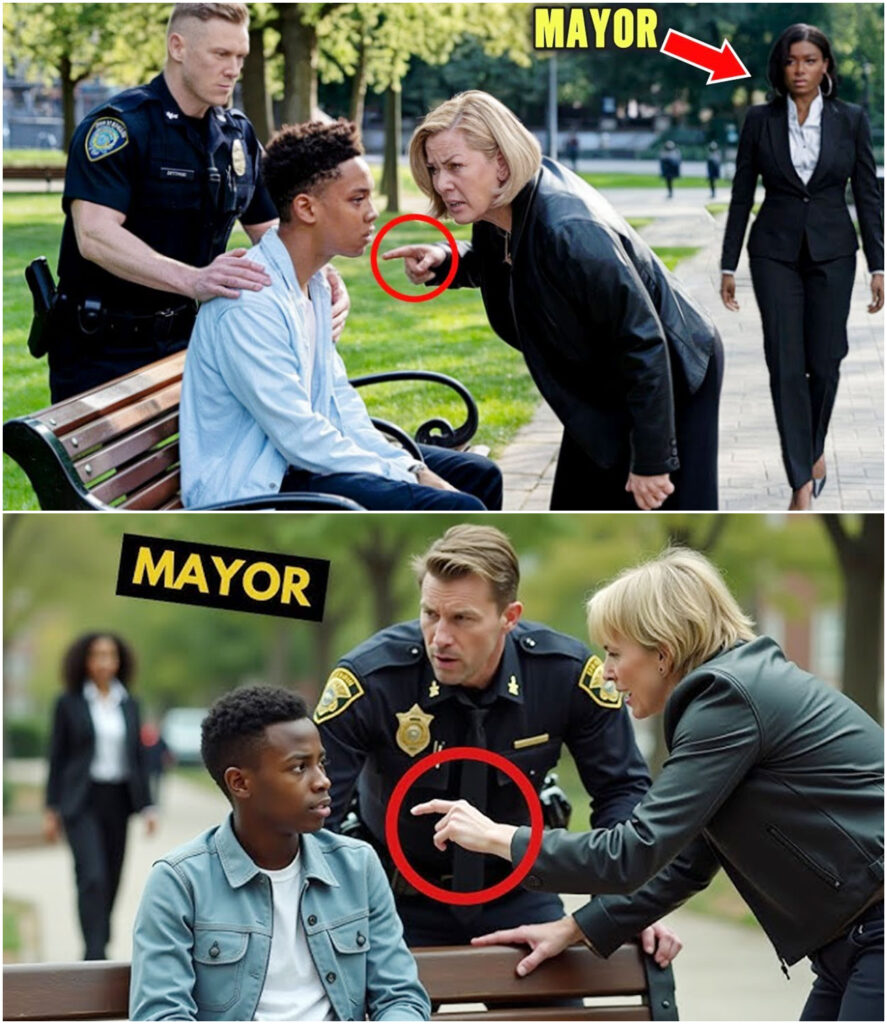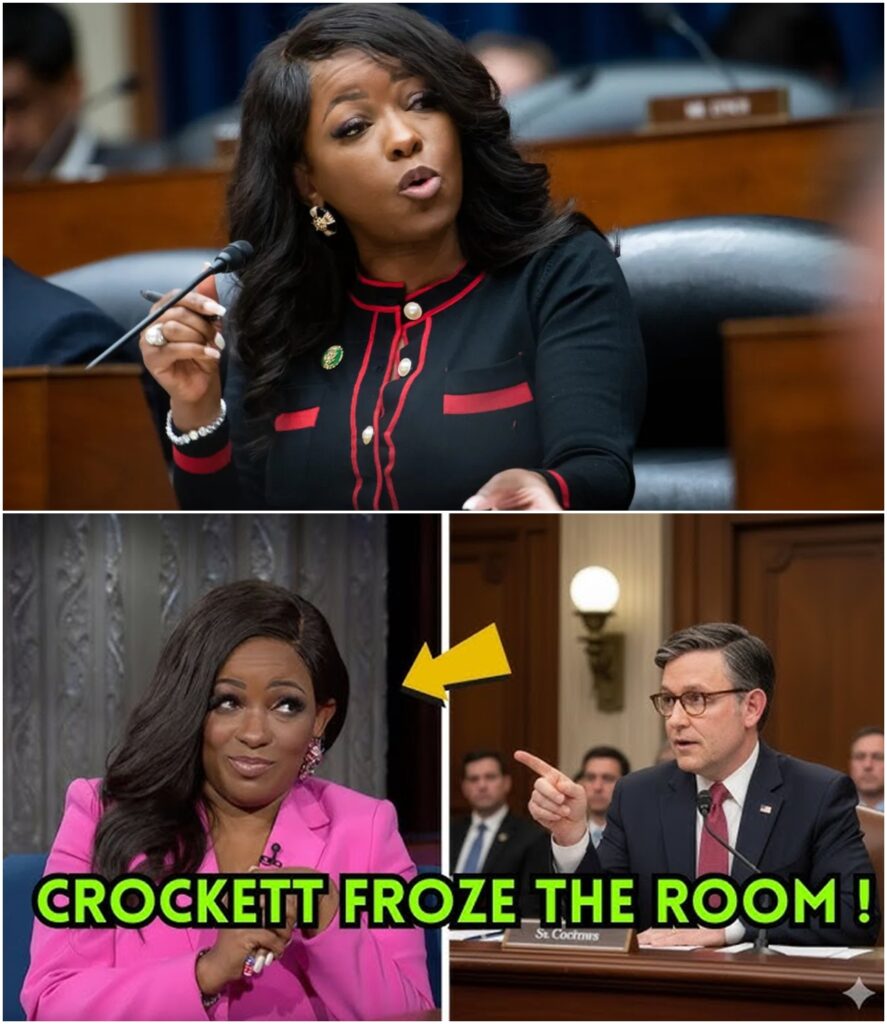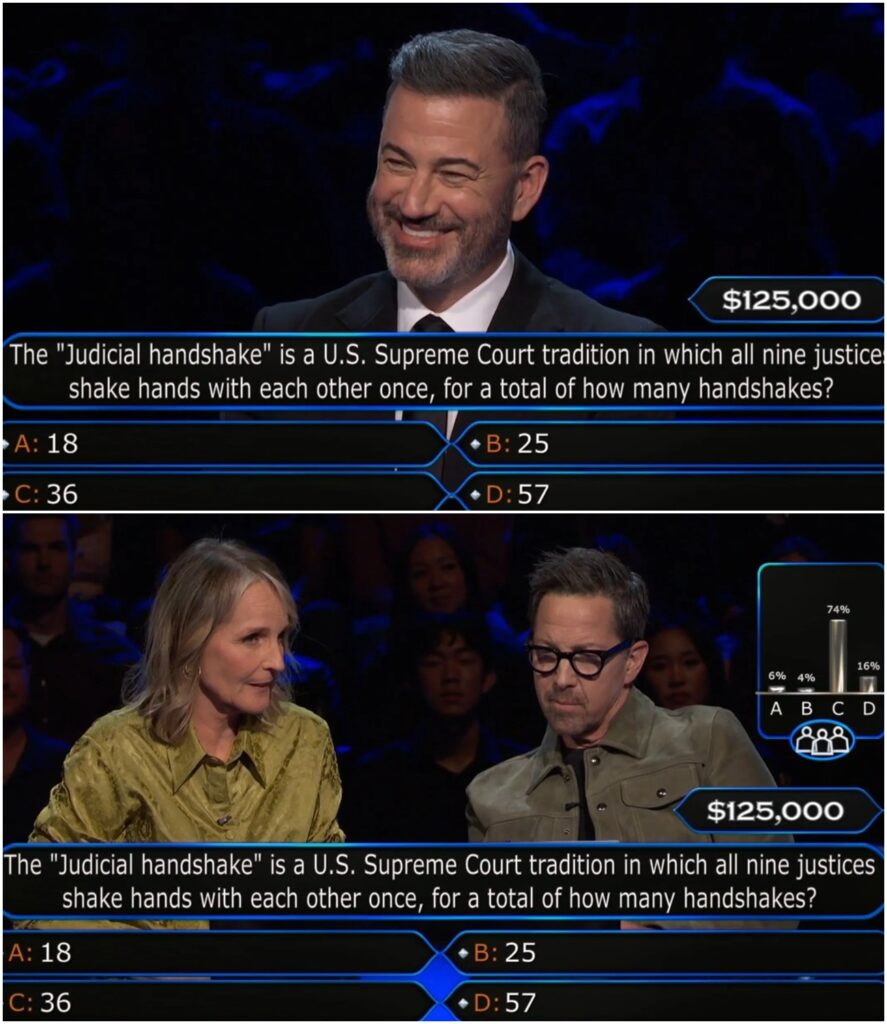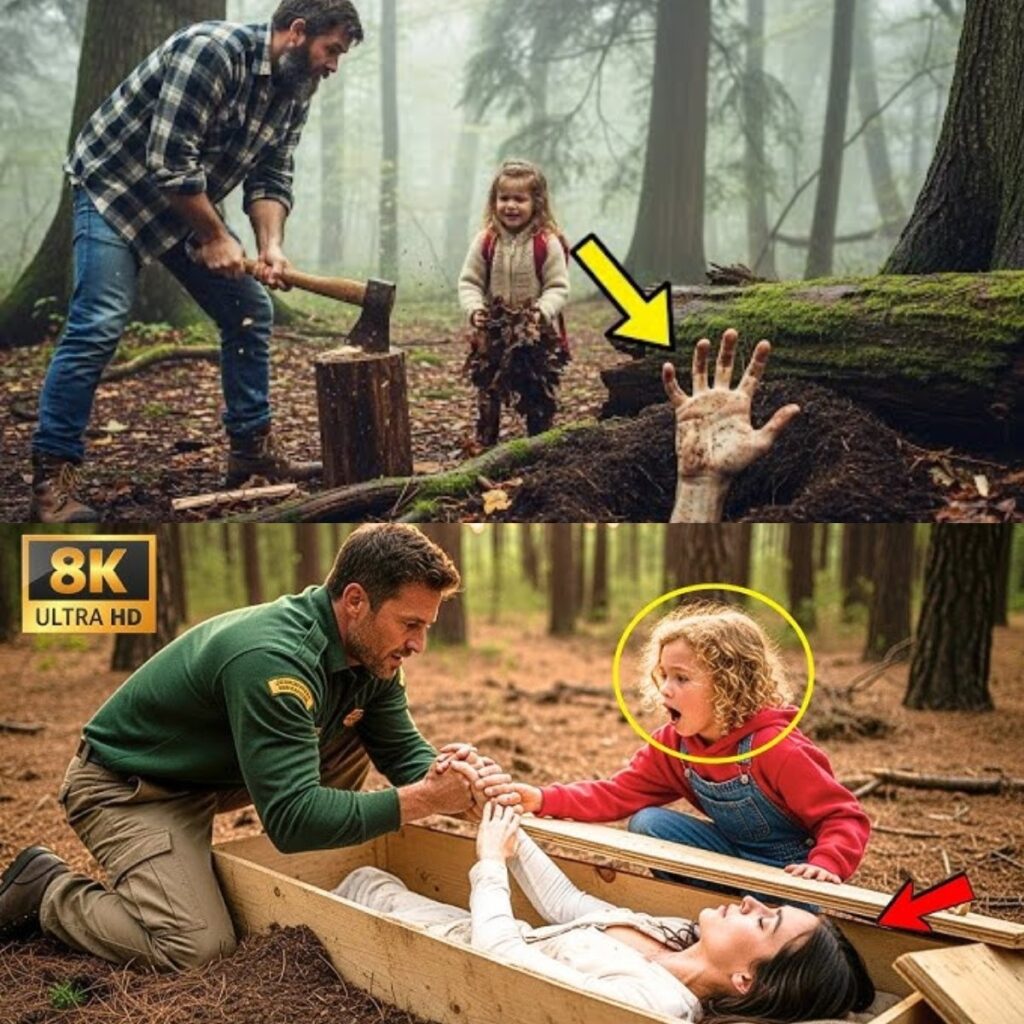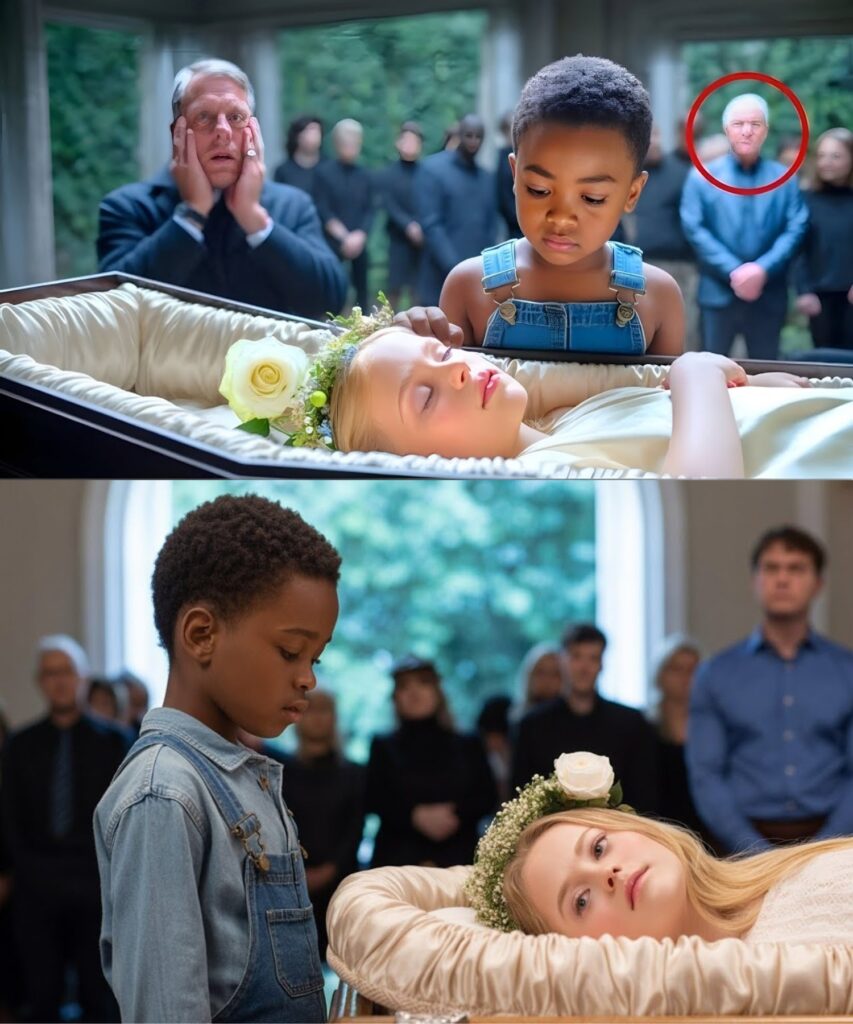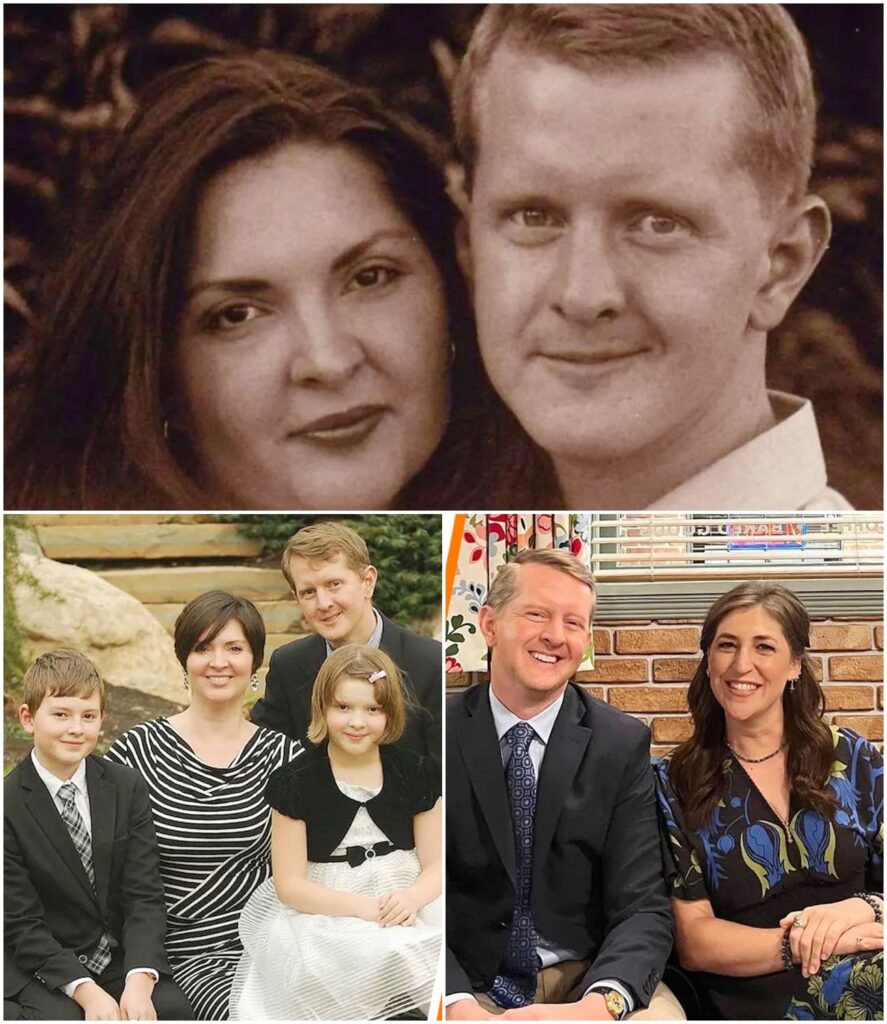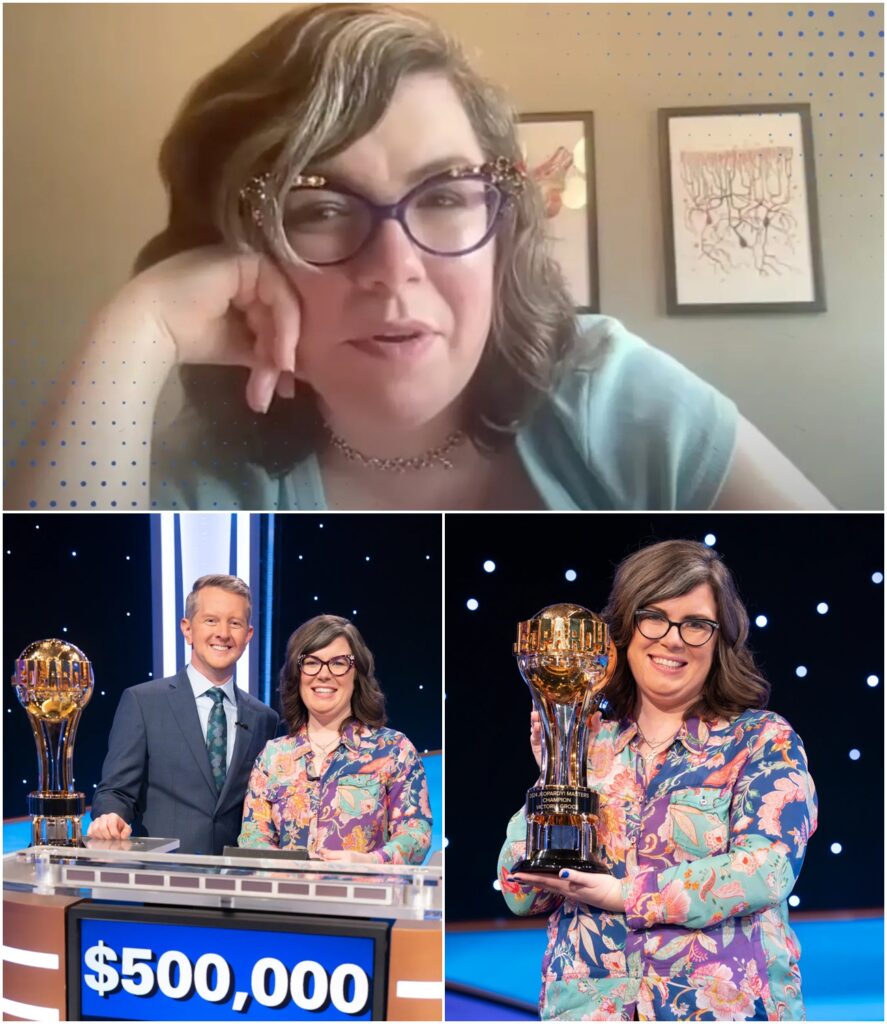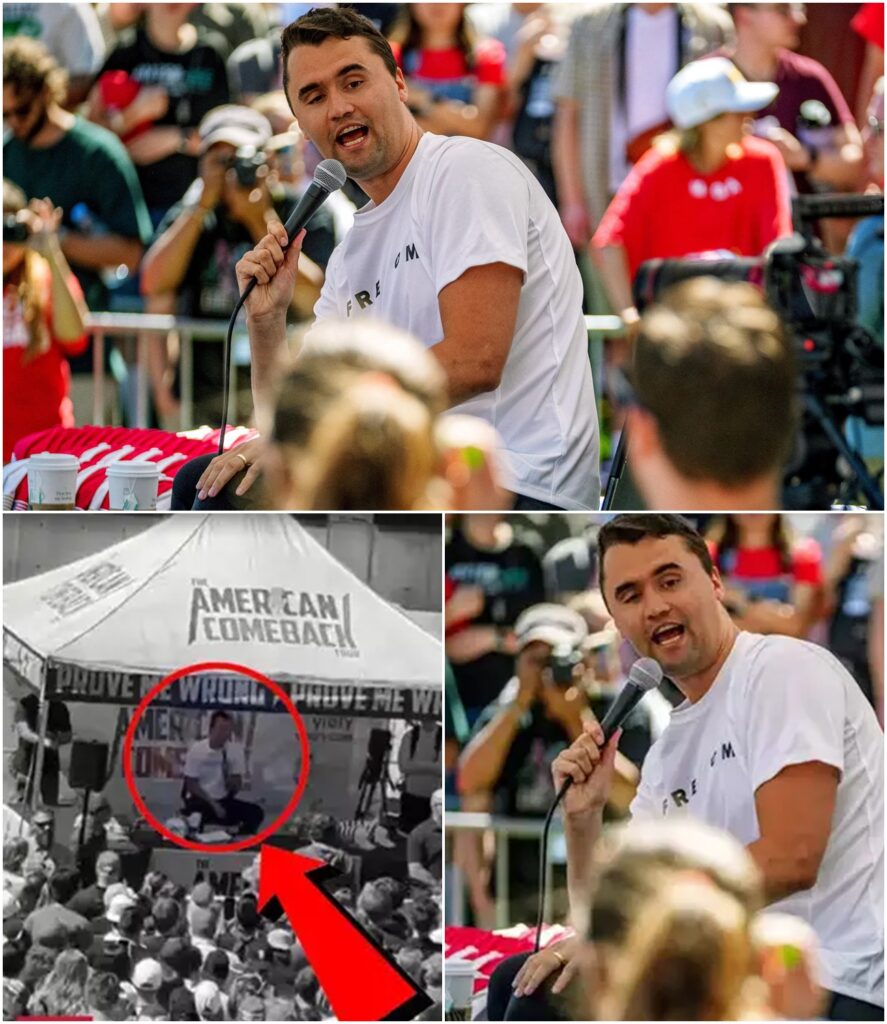Aristocrat Forces Maid to Play Piano to Humiliate Her — His Skill Stuns the Entire Audience…
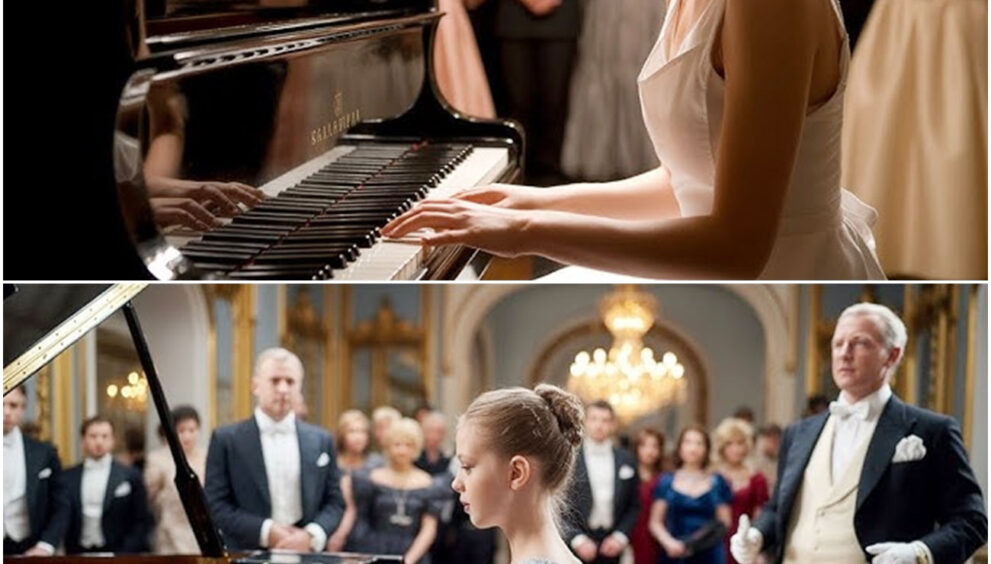
The grand ballroom of the Ashford Manor sparkled under the light of three massive crystal chandeliers. Ladies in silk gowns and gentlemen in tailored suits gathered for what promised to be the social event of the season. Lord Edmund Ashford, a man known throughout the county for his sharp tongue and cruel sense of humor, stood at the center of it all, basking in the attention of his wealthy guests.
Clara Bennett moved quietly along the edges of the room, carrying a silver tray filled with champagne glasses. She had worked as a maid at Ashford Manor for nearly 2 years. Ever since her father’s sudden death left her family drowning in debt. At 23 years old, she had once dreamed of becoming a music teacher.
But those dreams died the day she traded her books for a maid’s uniform. Her mother was ill and her younger brother needed schooling. Clara had no choice but to work. She kept her eyes down, knowing that invisibility was the best strategy for someone in her position. The aristocrats barely noticed the servants unless something went wrong. But tonight, something felt different. Clara could sense Lord Ashford’s eyes following her across the room.
It made her skin crawl. Lord Ashford was a man in his late 40s with graying hair sllicked back with expensive pomade and a mustache that he groomed obsessively. He came from old money, the kind that stretched back generations, and he never let anyone forget it.
His wife had died 5 years earlier, leaving him alone in the enormous manner with more rooms than he could count. Some said loneliness had made him bitter. Others claimed he had always been cruel. As Clara passed near the piano, a magnificent instrument that sat like a throne at one end of the ballroom, Lord Ashford suddenly clapped his hands together.
The sharp sound cut through the chatter and music bringing the room to silence. “Ladies and gentlemen,” he announced, his voice dripping with false cheerfulness. I have arranged a special entertainment for you this evening. The guests turned toward him with curious smiles. Champagne glasses paused halfway to their lips.
Clara tried to slip away toward the servants’s corridor, but Lord Ashford’s voice stopped her cold. You there, girl? Yes, you with the tray. Come here. Clara’s heart sank. Every eye in the room turned to look at her. She had no choice but to obey. Setting down her tray on a nearby table, she walked slowly toward Lord Ashford, her hands trembling slightly.
She kept her expression neutral, though fear churned in her stomach. “What is your name?” Lord Ashford asked, though she knew perfectly well that he already knew it. “He signed her wages every month.” “Clara Bennett, my lord,” she said quietly, keeping her eyes lowered. “Speak up, girl. My guest cannot hear you.” Clara raised her voice slightly.
“Clara Bennett, my lord.” “Ah, yes, Clara. Tell me, Clara, can you play the piano? The question struck her like a physical blow. Clara’s throat tightened. She had not touched a piano in 2 years. Not since her father sold their small upright piano to pay for medicine that ultimately did nothing to save him.
Music had been her entire world once, but that world was gone. I I used to play, my lord, but wonderful. Lord Ashford interrupted, cutting off any protest. You see, my friends, I discovered quite by accident that our dear Clara here was once quite the little pianist.
Her father was some sort of music teacher in town, was he not? Clara nodded stiffly, humiliation burning through her chest. She could feel the weight of dozens of eyes on her, assessing her worn uniform and rough hands. I thought it would be amusing, Lord Ashford continued, turning to address his guests, to see what talents might be hidden among the serving class.
Clara, please sit at the piano and play something for us. A ripple of laughter moved through the crowd. Clara understood immediately that this was not a genuine invitation. This was a game, a cruel form of entertainment designed to embarrass her. Lord Ashford wanted to watch her fumble through a piece she barely remembered to demonstrate the vast gulf between his world and hers. “My lord, I have not practiced in years,” Clara said, her voice barely above a whisper.
I do not think nonsense, Lord Ashford said sharply. Surely you remember something. Or perhaps your father was not the teacher he claimed to be. The insult to her father’s memory sparked something inside Clara. She looked up and met Lord Ashford’s eyes for just a moment. His expression was smug, confident in his power over her.
He expected her to refuse to run from the room in tears, providing him and his guests with an amusing story to tell at future parties. Clara walked slowly to the piano. The bench was covered in burgundy velvet, soft and luxurious under her rough hands as she sat down. The keys gleamed white and black in the candle light, perfectly maintained by the manor’s staff.
She placed her fingers on the keys and a flood of memories rushed back. Her father standing beside her, patient and encouraging. The small room where they practiced, filled with sunlight and the smell of tea. the feeling of music flowing through her, transforming mere notes into something beautiful behind her. She could hear the whispered comments of the guests.
They were already judging her, already forming their opinions about what would happen next. Lord Ashford stood to the side with his arms crossed, a satisfied smile on his face. Clara took a deep breath. Her hands were shaking, but not from fear anymore. She was angry.
Angry at the unfairness of her situation, angry at Lord Ashford’s cruelty, angry at a world that measured people’s worth by their wealth rather than their character. She closed her eyes for a moment, thinking of her father. He had taught her that music was not about showing off or proving something. Music was truth expressed in sound, emotion made tangible. She began to play.
The first notes came out hesitant, uncertain. Her finger stumbled slightly over a chord progression she had once known by heart. Behind her, someone laughed quietly. Lord Ashford’s smile grew wider. This was exactly what he had wanted. But then something changed.
Clara’s fingers found their rhythm, muscle memory awakening after its long sleep. The hesitation vanished, replaced by growing confidence. She chose a piece her father had loved, a complex composition that required both technical skill and deep feeling. As she played, the ballroom fell silent. The mocking whispers stopped. Even the servants who had been moving discreetly around the edges of the room paused to listen.
Clara poured everything into the music. All her grief, her frustration, her lost dreams, and her quiet strength flowed through her fingers into the piano. The notes filled the massive ballroom, rich and powerful, telling a story that needed no words. The transformation in the ballroom was immediate and profound.
What had begun as a cruel joke orchestrated by Lord Ashford had become something else entirely. Clara’s fingers moved across the keys with increasing confidence, drawing out melodies that seemed to reach into the hearts of everyone present.
The piece she had chosen was technically demanding, filled with rapid passages that required years of practice, yet her hands navigated them with surprising grace, despite her long absence from the instrument. Lady Peton, a woman known for her patronage of the arts and her sharp critical eye, leaned forward in her seat.
She had attended countless concerts in London and Paris, had heard some of the finest pianists in Europe, and yet something about this young maid’s playing captured her attention in a way she had not expected. The technical execution was imperfect, certainly with occasional stumbles that revealed the lack of recent practice, but there was an emotional depth to the performance that many professional musicians never achieved. Lord Ashford’s confident smile began to fade.
He had expected Clara to play poorly, perhaps to break down in tears at the piano bench, providing his guests with an evening’s worth of amusing conversation. Instead, he watched as his carefully planned humiliation backfired spectacularly. The guests were not laughing at Clara.
They were listening to her with genuine interest and growing admiration. Colonel Hartwick, a retired military man with a reputation for blunt honesty, turned to Lord Ashford and spoke loud enough for several people nearby to hear. Where did you find this girl? She plays remarkably well. Lord Ashford forced a thin smile. Just a servant, Colonel.
I thought it would be amusing to see what hidden talents might exist below stairs. Amusing? Lady Peton interjected her tone cool. I find it quite impressive actually. The girl clearly has real training. Clara remained focused on the music, unaware of the conversations happening behind her. She had entered a state that her father used to call the flow, where nothing existed except the piano and the music flowing through it.
Her fingers found their way through the complex passages almost instinctively, guided by years of practice that her body had not forgotten, even if her conscious mind had doubted. The piece she played told a story of loss and resilience, of darkness giving way to hope. It was not cheerful music meant for dancing or background entertainment.
It was serious, contemplative, and deeply moving. The composition built gradually, moving through phases of quiet introspection and passionate intensity. Clara’s whole body moved with the music, swaying slightly as she navigated the emotional landscape of the piece. In the corner of the room, Mrs.
Winters, the head housekeeper, watched with tears streaming down her weathered face. She had known about Clara’s background when the girl first arrived seeking work. She had seen the calluses on Clara’s hands disappear over time, replaced by the rough skin that came from scrubbing floors and washing dishes. Mrs.
Winters had sometimes heard Clara humming quietly while she worked, always quickly silencing herself if someone approached. Now watching the transformation taking place at the piano, the housekeeper felt a mixture of joy and deep sadness at the waste of such talent. Thomas Blackwood, a young nobleman visiting from a neighboring estate, stood transfixed.
He had come to the party expecting the usual tedious evening of forced conversation and political maneuvering. His father was pressuring him to make advantageous social connections, to consider marriage to one of the suitable young ladies in attendance. But the moment Clara began to play, all such thoughts vanished from his mind.
He watched her completely absorbed in the music, her face showing emotions that the aristocratic ladies around him had been trained since childhood to hide. There was something authentic about her, something real that stood in sharp contrast to the artificial world he inhabited.
The music swelled toward its climax, Clara’s hands moving in a blur across the keys, the chandelier crystals seemed to vibrate with the powerful chords that filled the space. This was the most technically challenging section of the piece, a passage that had taken Clara months to master under her father’s patient instruction. Her fingers flew through it now with fierce determination. each note precise and clear despite the breakneck speed.
And then just as suddenly as the intensity had built, the music softened. Clara’s touch became gentle, almost tender as she guided the piece toward its conclusion. The final notes hung in the air like the last light of sunset, beautiful and ephemeral before fading into silence. For a long moment, no one moved.
The ballroom remained utterly quiet, as if everyone was afraid to break the spell the music had cast. Clara kept her hands on the keys, her eyes still closed, slowly returning to awareness of where she was and what had just happened. The reality of the situation came crashing back. She was a maid who had just played piano at a ball, surrounded by people who considered her beneath them.
Then the applause began. It started with Colonel Hartwick, his large hands clapping together with military precision. Lady Peton joined him immediately and within seconds the entire ballroom erupted in genuine enthusiastic applause. Some of the guests rose to their feet, something that Clara, with her eyes now open and her face flushing red with embarrassment, could hardly believe.
She stood up quickly from the piano bench, her legs unsteady beneath her. She had not expected this reaction. She had expected mockery, perhaps a few polite claps followed by dismissal. Instead, the aristocrats were applauding her as they would a professional performer. The sound was overwhelming, disorienting. Lord Ashford stood frozen, his face a mask of barely contained anger.
His plan had not just failed, but had completely reversed on him. Instead of proving the inferiority of the serving class, he had inadvertently revealed that talent and worth had nothing to do with birth or wealth. His guests were now looking at his maid with admiration and respect. emotions they usually reserved for their own social equals.
“Thank you, Clara,” he said loudly, cutting through the applause with a forced joviality. “That was quite entertaining. You may return to your duties now, but Lady Peton stepped forward before Clara could escape.” “Just a moment, Lord Ashford. I should like to speak with the girl.” Clara froze, uncertain what to do. She looked desperately toward Mrs.
Winters, who gave her an encouraging nod. Lady Peton approached the piano with measured steps, her silk gown rustling. She was a tall woman in her 50s with silver hair elegantly styled and sharp blue eyes that missed nothing. “What is your name, child?” Lady Peton asked, though Clara had already stated it earlier. “Clara Bennett, my lady.
” “And where did you learn to play like that?” Clara swallowed hard. “My father was a music teacher, my lady. He taught me from the time I was very young until until he passed away two years ago. Lady Peton’s expression softened slightly. He taught you well. That was Beethoven’s sonata pathetic, was it not? Clara nodded, surprised that Lady Peton had recognized the piece. Yes, my lady. It was my father’s favorite.
Mine as well, Lady Peton said quietly. You played the second movement with real feeling. Tell me, do you still practice? No, my lady. I have not had access to a piano since I came to work here. A crime, Lady Peton declared, turning to address Lord Ashford. A positive crime to let such talent go to waste.
Lord Ashford’s jaw tightened at Lady Peton’s words, but he maintained his composure. He was trapped by the social conventions of his class. Lady Peton was one of the most influential women in the county. Connected to half the noble families in England through blood or marriage.
To openly contradict her would be a serious breach of etiquette that could damage his standing in society. Surely you exaggerate, Lady Peton, he said with a tight smile. The girl plays adequately for someone of her station, but she is employed here as a maid, not a musician. Adequately? Colonel Hartwick barked out a laugh. Edmund, I have attended the Royal Opera House in London, and I have heard performers who displayed less passion than this young woman.
You have a remarkable talent working in your household, and you did not even know it. Other guests murmured their agreement. Clara stood motionless, wishing desperately that she could disappear. She had not wanted this attention. She had only wanted to honor her father’s memory and prove to Lord Ashford that she was not someone to be casually humiliated. Now she found herself at the center of a social drama that she did not understand and could not control.
Thomas Blackwood approached the small group that had formed around Clara. Unlike many of the other young noblemen present, Thomas had a genuine interest in music and the arts, his mother, before her death had been an accomplished pianist herself, and she had instilled in him an appreciation for true talent regardless of its source.
“Miss Bennett,” he said, addressing Clara directly and using the formal title despite her servant status, which caused several eyebrows to rise. “How long did you study music with your father?” Clara hesitated, glancing at Lord Ashford, who stood with his arms crossed and his expression thunderous.
But the question had been asked directly, and she could not ignore it without being rude. 15 years, sir, from the time I was 5 until his death, and he was a professional teacher. Yes, sir. He taught piano and music theory to students in town. Some of his students went on to attend conservatories in London. Thomas nodded thoughtfully.
Did you ever consider pursuing music professionally yourself? The question was innocent, but it struck Clara like a blow. She had considered it. She had dreamed of it. Her father had encouraged her to audition for the Royal Academy of Music in London. She had been preparing for that audition when he fell ill, and all their savings went toward doctors and medicine that could not save him.
“I had hoped to, sir,” she said quietly, but circumstances changed. Lady Peton, who had been listening to this exchange with great interest, made a decision. She was a woman of considerable wealth and influence, and she had spent much of her life supporting young artists whose talents might otherwise have gone undiscovered.
She had sponsored painters, writers, and musicians, helping them establish careers that brought beauty and culture to the world. Looking at Clara, she saw not just talent, but a story that touched her heart. Lord Ashford, she said firmly, I should like to make you a proposal. I am hosting a musical evening at my estate next month.
Several notable performers will be attending, including a pianist from Vienna who is touring England. I would like Miss Bennett to perform as well. The room erupted in surprise chatter. Such an invitation was extraordinary, almost scandalous. To invite a maid to perform at a social gathering alongside professional musicians was simply not done.
It blurred the rigid class boundaries that structured their entire society. Lord Ashford’s face turned an unpleasant shade of red. Lady Peton, I must object. Clara is employed in my household. She has duties and responsibilities. I cannot simply allow her to gallivant off to musical evenings. I am not asking for your permission. Lady Peton replied coolly.
I am offering to hire Miss Bennett for the evening. I will pay whatever wage you would lose by her absence, plus compensation for her time. Unless, of course, you believe your household would collapse without a single maid for one evening, the challenge was clear.
Lord Ashford could refuse, but doing so would make him appear petty and cruel in front of his guests. He was already on shaky ground after his attempt to humiliate Clara had backfired so completely. Several of the guests were watching him with expressions ranging from disapproval to outright disgust. They had seen his true nature tonight, the mean-spiritedness that he usually concealed behind aristocratic charm.
And what if the girl does not wish to perform? He asked, grasping at straws. Perhaps she has no desire to be displayed like some curiosity for your entertainment. All eyes turned to Clara. She felt her heart pounding in her chest. This was happening too fast. Just minutes ago, she had been invisible, a servant carrying champagne. Now she was being offered an opportunity that seemed impossible, like something from a dream.
But was it really an opportunity? Lady Peton seemed kind, but Clara had learned that the aristocracy rarely did anything without selfish motives. Would performing at this musical evening help her, or would it simply make her into an amusing story that Lady Peton could tell her friends? Look at the extraordinary maid I discovered, she would say. and Clara would remain a maid only now with the added burden of unfulfilled hope.
Miss Bennett, Lady Peton prompted gently, “Would you like to perform at my musical evening? You would be properly compensated, of course, and transported to and from my estate in comfort.” Clara looked at Mrs. Winters, the only person in the room who might offer her honest guidance.
The older woman’s eyes were still wet with tears, but she nodded encouragingly. Clara thought of her father, of how proud he would have been to see her play before an audience that truly appreciated music. She thought of her mother, ill and growing weaker, who needed medicine that Clara’s maid’s wages could barely afford. Perhaps this was an opportunity. Perhaps it was a trap. But Clara knew one thing with certainty.
If she refused, she would regret it for the rest of her life. “Yes, my lady,” Clara said, her voice steady despite her nervousness. I would be honored to perform. The room erupted in applause again, though this time Lord Ashford did not join in. His expression was cold and dangerous. Clara felt a chill run down her spine.
She had just defied him in front of his guests, had accepted an invitation that he clearly opposed. There would be consequences for this, she was certain. Excellent, Lady Peton declared. I will send word to you with the details, Miss Bennett, and I expect you to begin practicing immediately. I want you to prepare three pieces, each showcasing different aspects of your abilities.
Thomas Blackwood stepped forward again. Lady Pimton, if I might make a suggestion. Miss Bennett mentioned she has not had access to a piano for practice. Perhaps arrangements could be made. An excellent point, Mr. Blackwood. Lady Peton turned her sharp gaze on Lord Ashford.
Surely you have a piano somewhere in this vast manner that Miss Bennett might use during her free time. I assume you do allow your servants some hours of rest. Lord Ashford’s mouth opened and closed like a fish gasping for air. He did indeed have several piano scattered throughout Ashford Manor, the one in the ballroom and upright in the music room, and even an old instrument in the servants quarters that had not been played in years.
To refuse Lady Peton’s reasonable request would make him look even more petty and vindictive than he already appeared. Of course, Lord Ashford said through gritted teeth, there is an old piano in the servants area. Clara may use it during her limited free time, provided it does not interfere with her duties.
How generous, Lady Peton said, and the sarcasm in her tone was unmistakable to everyone present. I am certain Miss Bennett will make good use of the opportunity. Now, shall we return to the festivities? I believe there was mention of supper. The tension in the room broke as the guests began to move toward the dining room. Clara stood frozen by the piano, unsure what to do next. Mrs.
Winters appeared at her elbow, gently touching her arm. “Come along, dear,” the housekeeper whispered back to the kitchens before his lordship remembers you are still here. Clara followed Mrs. Winters out of the ballroom, her mind spinning. “What had just happened?” In the space of less than an hour, her entire life had been turned upside down.
She had been publicly humiliated, then celebrated, and now she had been invited to perform at an aristocratic musical evening. It felt unreal, like a story from one of the novels she sometimes borrowed from the manor’s library. As they walked through the servants corridors, Clara could hear Mrs.
Winters chuckling softly. I wish I could have seen his lordship’s face properly. All these years, he has strutdded about like a peacock, looking down on everyone. Tonight you reminded him that breeding and money do not make a person superior. He will make my life miserable for this,” Clara said quietly.
“Perhaps,” Mrs. Winters admitted, or perhaps he will be too embarrassed to acknowledge what happened. “Either way, child, you played beautifully. Your father would have been so proud.” Tears pricked at Clara’s eyes. She blinked them back, not wanting to break down in the corridor. The night was far from over.
She still had hours of work ahead of her, serving the guests and cleaning up after the party, but for just a moment she allowed herself to feel the joy of having played the piano again, of having connected with music that had once been the center of her world. The following week passed in a blur of tension and whispered gossip.
Word of what had happened at Lord Ashford’s ball spread quickly through the county. Servants from neighboring estates brought news when they visited the manor on errands. Clara became something of a celebrity among the working class, the maid who had embarrassed a cruel lord in front of his wealthy friends. But within Ashford Manor itself, the atmosphere was toxic.
Lord Ashford barely spoke to Clara, but his silence was somehow more menacing than his anger would have been. He assigned her the worst jobs, the ones that left her exhausted and sore at the end of each day. She spent long hours scrubbing floors on her hands and knees, hauling heavy buckets of water, and cleaning the filthiest corners of the massive house. Mrs.
Winters tried to intervene, but Lord Ashford made it clear that if she continued to show favoritism toward Clara, she too would face consequences. The housekeeper was in her 60s and had no other employment prospects. She could not risk losing her position, so she was forced to watch helplessly as Clara was worked to exhaustion.
Despite the grueling schedule, Clara made her way to the old piano in the servants’s quarters every night after her work was finished. The instrument was badly out of tune and several keys stuck, but it was still playable. She practiced for hours by candle light, her rough and blistered hands moving across the worn keys, relearning pieces she had not played in years, and learning new ones from old sheet music she found stored with the piano.
The other servants would gather outside the small practice room, listening to her play. Sarah, a young kitchen maid who had become Clara’s friend, often brought her tea and bread while she practiced. “You should not be working yourself to death like this,” Sarah said one night, watching Clara’s fingers fly across the keys despite their obvious pain.
“You have barely slept in days.” “I have to practice,” Clara replied, not stopping her playing. “Lady Peton expects me to perform in two weeks. I cannot disappoint her. His lordship is trying to break you, Sarah observed. He wants you to be too tired to practice, too exhausted to perform well.
Then he can prove that you were just a fluke, that he was right to look down on you all along. Clara knew Sarah was right. But she refused to give Lord Ashford that satisfaction. She would practice until her fingers bled if necessary. This performance was not just about music anymore. It had become a battle of wills between a powerless maid and a vindictive aristocrat.
One afternoon, as Clara was cleaning the windows in Lord Ashford’s study, he finally spoke to her directly. “You think you are special now,” he said, not looking up from the papers on his desk. “You think that one evening of applause has changed your position in the world.” Clara remained silent, continuing to clean the window.
“Let me explain something to you,” Lord Ashford continued, his voice cold. “Lady Peton is a kind woman, but her attention is fleeting. She will tire of you as she has tired of countless other projects over the years. After your little performance, you will return here and you will still be a maid. Nothing will have changed. Yes, my lord, Clara said quietly.
And when you fail, when you embarrass yourself in front of Lady Peton’s distinguished guests. Everyone will remember that I was right about you all along. You are a servant. That is all you will ever be. Clara felt anger boiling inside her, but she forced it down.
She could not afford to lose her temper, not when her mother and brother depended on her wages. So she simply finished cleaning the window and left the study without another word. But that night she practiced harder than ever, channeling her anger and frustration into the music. The old piano’s limitations forced her to focus on expression rather than technical perfection.
She learned to make the instrument sing despite its flaws, much as she had learned to maintain her dignity, despite the degrading circumstances of her life. Thomas Blackwood visited the manor twice during those two weeks, ostensibly calling on Lord Ashford to discuss business matters related to their neighboring estates, but on both occasions he found excuses to wander toward the servants quarters when Clara was practicing.
He stood in the hallway listening to her play, marveling at her dedication and talent. On his second visit, Clara took a break from practicing and found him standing outside the door. “Mr. Blackwood,” she said, startled and embarrassed. “I did not know anyone was listening.” “Forgive me,” Thomas said quickly. “I did not mean to intrude.
I was visiting Lord Ashford and happened to hear the music. You play beautifully, even on this poor instrument.” Clara glanced nervously down the hallway, worried that someone might see her speaking with a nobleman without proper supervision. Such interactions could be misinterpreted and lead to scandal. I should return to my practice, she said.
Lady Peton’s musical evening is less than a week away. Of course, but Miss Bennett, before you go, I wanted to tell you something. What you did at the ball standing up to Lord Ashford through your music, it was remarkable. Many people in your position would have been too frightened or too beaten down to even try.
Clara looked at him properly for the first time. Thomas Blackwood was not much older than she was, perhaps 26 or 27. He had kind eyes and an earnest manner that seemed genuine rather than condescending. She had learned to be suspicious of aristocratic kindness, but something about him felt different. “I played for my father,” Clara said simply.
“Not for Lord Ashford or anyone else. My father believed that music was a gift meant to be shared. Regardless of who you were or where you came from. I was just honoring his memory. He sounds like a wise man, Thomas said. He was the best man I ever knew, Clara replied, her voice thick with emotion. I only wish he could have seen what happened that night. Perhaps he did, Thomas suggested gently.
The day of Lady Peton’s musical evening arrived with unexpected swiftness. Clara woke before dawn as she always did, but this morning felt different. Her hands trembled as she dressed in her plain servants clothes. Mrs. Winters had arranged for her to have the afternoon off to prepare, a small mercy that Clara suspected had required considerable negotiation with Lord Ashford.
Lady Peton had sent a dress for Clara to wear during the performance, a simple but elegant gown in deep blue silk that was finer than anything Clara had ever touched. The accompanying note explained that Lady Peton wanted Clara to feel confident on stage and that appearance mattered in the world of performance. Clara tried on the dress in her tiny room, barely believing that she would be wearing such a beautiful thing.
At noon, a carriage arrived to collect her. It was not Lady Peton’s finest vehicle, but it was comfortable and wellappointed, far superior to any transportation Clara had ever experienced. The driver, an elderly man with a kind face, helped her into the carriage with a respect that made her uncomfortable. She was not used to being treated with courtesy. The journey to Lady Peton’s estate took an hour.
Clara spent the time reviewing the music in her mind, her fingers unconsciously moving through the difficult passages. She had chosen three pieces that showcased different styles and emotions. The first was the Beethoven sonata she had played at Lord Ashford’s ball because Lady Peton had specifically requested it.
The second was a Shopan Noctturn, lyrical and romantic. The third was a boach fugue, technically demanding and intellectually rigorous. Lady Peton’s estate was magnificent, even larger than Asheford Manor. The house sat on a hill overlooking manicured gardens that stretched for acres. As the carriage pulled up to the main entrance, Clara felt her confidence wavering. What was she doing here? She was a maid, not a performer.
These people would see through her immediately, but there was no turning back now. A footman opened the carriage door and helped her down. Lady Peton herself appeared in the doorway, smiling warmly. Miss Bennett, welcome. I am delighted you could come. Please follow me. We have much to prepare before this evening’s performance.
Lady Peton led Clara through the grand house to a music room that took Clara’s breath away. The room was designed specifically for performances with perfect acoustics and a magnificent grand piano that looked brand new. Windows along one wall overlooked the gardens, filling the space with natural light.
This is where you will practice for the next few hours, Lady Peton explained. The piano was tuned yesterday specifically for tonight’s concert. Please familiarize yourself with it. Every instrument has its own personality, and you will want to understand this one before performing. Clara approached the piano reverently.
She sat on the bench and placed her hands on the keys. The touch was completely different from the old battered instrument she had been practicing on. This piano was responsive and alive, each note clear and pure. She began to play a few scales, adjusting to the feel of the instrument. Lady Peton watched for a few moments, then nodded with satisfaction. Good. I will leave you to your practice. A maid will bring you refreshments.
The performance begins at 8:00. Guests will arrive at 7:00 for drinks and conversation. You will perform after the vianese pianist and before supper. After Lady Peton left, Clara lost herself in practice.
The quality of the instrument inspired her, bringing out nuances in the music that had been impossible on the old piano at the manor. She worked through each piece multiple times, making small adjustments and discovering new interpretations. A maid did indeed bring refreshments, tea, and delicate sandwiches that Clara barely touched despite not having eaten since breakfast. Her stomach was too nodded with nervousness to accept food.
As the afternoon wore on, and the light changed from bright sunshine to golden evening glow, Clara felt her anxiety building. At 6:00, Lady Peton returned with another woman, a professional lady’s maid who helped Clara prepare for the evening.
The blue silk dress fit perfectly, and the maid arranged Clara’s hair in a style that was simple but elegant. When Clara looked at herself in the mirror, she barely recognized the person staring back at her. “She looked like a lady, not a servant.” “You look lovely,” Lady Peton said approvingly. “Now, I must warn you about tonight. Many of the guests are here specifically to see you perform.
Word has spread about what happened at Lord Ashford’s ball, and there is considerable curiosity about the maid who plays like a professional. Some of them will be hoping you succeed. Others will be hoping you fail, as that would confirm their beliefs about the natural order of society. Clara swallowed hard.
I understand, my lady. Do not let them intimidate you, Lady Peton continued. You have real talent, Miss Bennett. I would not have invited you here if I did not believe that. Play as you did at the manor with honesty and passion, and you will win them over. At 7:00, the guests began to arrive.
Clara remained in the music room, listening to the sounds of conversation and laughter drifting in from the main hall. She paced nervously, occasionally sitting at the piano to run through particularly difficult passages. The vianese pianist arrived, a stern-looking man in his 50s named Hair Schneider, who had performed throughout Europe. He came to the music room to inspect the piano and found Clara there.
He looked at her with barely concealed disdain. “You are the maid everyone is talking about,” he asked in heavily accented English. “Yes, sir,” Clara replied quietly. “H,” he said, looking her up and down. “Lady Peton has strange hobbies. I hope you do not embarrass yourself too badly.
It would reflect poorly on this entire evening. He turned away and began playing scales on the piano, pointedly ignoring Clara. She felt her face burning with humiliation. Perhaps Lord Ashford had been right. Perhaps she was deluding herself, thinking she could perform alongside true professionals. At 7:45, Lady Peton came to collect hair for his performance.
She gave Clara an encouraging smile before leading the pianist away. Clara could hear the applause as he was introduced, followed by the beginning of his performance. Even from the music room, she could tell he was technically brilliant, his fingers moving with machine-like precision through a challenging Mozart sonata.
The applause after his performance was enthusiastic. Clare’s hands grew cold with dread. How could she possibly follow such a performance? The guest would inevitably compare her to Har Schneider and she would be found wanting. She was a self-taught amateur, a maid playing at being a musician. Then she thought of her father.
He had always told her that music was not a competition. It was not about being better or worse than anyone else. It was about truth and emotional honesty. Her Schneider might have superior technique, but Clara had something else to offer. She had heart. She had lived through real hardship and loss, and that experience was reflected in her music.
Lady Peton appeared at the door. “Miss Bennett, it is time.” Clara stood on shaking legs and followed Lady Peton into the performance hall. The room was filled with perhaps 80 guests, all dressed in their finest evening wear. Conversation stopped as Clara entered. She could feel their eyes on her, assessing her, judging her.
She saw Lord Ashford sitting near the back, his expression coldly neutral. Several other guests from his ball were present as well. Thomas Blackwood sat in the third row and he gave her an encouraging nod when their eyes met. Lady Peton introduced her to the audience.
Ladies and gentlemen, our next performer is Miss Clara Bennett. Some of you may have heard about Miss Bennett’s remarkable performance at Lord Ashford’s ball two weeks ago. I have invited her here tonight because I believe true talent deserves to be recognized and celebrated regardless of its source. Miss Bennett will be playing three pieces for us this evening.
The polite applause was restrained, skeptical. Clara walked to the piano on legs that felt like they might give out beneath her. She sat on the bench and adjusted her position, taking a moment to steady her breathing. Her hands rested on the keys and she closed her eyes. Clara blocked out everything except the music.
The audience, the judgment, the fear, all of it faded away as her fingers found the first notes of the Beethoven sonata. The piano responded beautifully to her touch and she felt a surge of confidence. This was why she had endured the past two weeks of exhaustion and pain. This moment, this connection with music was worth everything. The first movement of the sonata emerged with power and drama.
Clara’s hands moved with authority across the keys, drawing out the passionate intensity that Beethoven had written into the piece. She was no longer thinking about technique or execution. She was simply channeling the emotion, letting the music flow through her without interference from her conscious mind. The audience sat in stunned silence. Whatever they had expected from the maid, this was not it.
Even those who had come hoping to see her fail found themselves drawn into the performance. Hair Schneider standing at the back of the room with his arms crossed felt his skepticism beginning to crack. The girl had obvious technical limitations, her training incomplete in ways that showed, but there was something undeniable in her playing.
She had a gift for interpretation, for finding the emotional core of the music and expressing it clearly. Clara moved from the dramatic first movement into the famous second movement, the adagio canab that had touched so many listeners over the centuries. Her touch became gentle, almost fragile as she navigated the lyrical melody.
This was the movement her father had loved most, and she played it as a conversation with his memory. Every note was a word, every phrase a sentence in a dialogue between the living and the dead. Several women in the audience found tears streaming down their faces. They did not fully understand why this music affected them so deeply, but they could not resist its emotional pull.
Even the men trained from childhood to suppress their feelings felt something stirring in their chests. This was not just a performance. This was a window into a young woman’s soul. And what they saw there was beautiful and heartbreaking. When the final notes of the Beethoven faded into silence, there was a long pause before the applause began. But when it came, it was thunderous. People rose to their feet spontaneously, clapping with genuine enthusiasm.
Clara opened her eyes, blinking in surprise at the response. She had been so lost in the music that she had forgotten where she was. Lord Ashford remained seated, his face pale. He had been certain that Clara would fail, that the pressure of performing for such a sophisticated audience would expose her as a pretender. Instead, she had succeeded beyond anyone’s expectations.
The guests were applauding her with the same enthusiasm they had shown for Her Schneider, perhaps even more. Clara took a moment to let the applause wash over her, then raised her hands to begin the second piece. The Shopan noturn was completely different in character from the Beethoven where the sonata had been dramatic and intense.
The nocturn was dreamy and romantic. Clara’s playing took on a different quality, becoming more intimate and personal, as if she were playing for a single listener rather than a crowd. The melody floated through the room like perfume, delicate and beautiful. Shopan’s genius lay in his ability to create music that seemed simple on the surface, but revealed layers of complexity and emotion upon closer listening. Clara understood this instinctively.
She did not rush through the piece, trying to impress with speed or flash. Instead, she took her time, savoring each phrase and allowing the music to breathe. Thomas Blackwood watched her with something approaching awe. He had been raised in a world of privilege and refinement, surrounded by culture and education from birth. Yet this young woman, who had known poverty and hardship, who had been forced to scrub floors and serve at tables, possessed a depth of feeling and artistic sensitivity that put most of his social class to shame.
It seemed fundamentally unjust that someone with such gifts should be trapped in servitude. The nocturn came to its quiet conclusion, the final notes hanging in the air like stars. The applause this time was different, softer, but no less appreciative.
The audience seemed to recognize that they had witnessed something special, something that transcended technical skill or professional training. Clara prepared for the final piece, the boach fugue. This would be the most challenging technically, a piece that required not just emotional depth, but intellectual rigor and perfect control. She had chosen it deliberately, wanting to prove that she was not just an emotional performer, but a serious musician with comprehensive abilities.
The fugue began with a single melodic line, clear and precise. Gradually other voices entered, weaving together in counterpoint. Box fuges were like mathematical puzzles made of sound, each voice independent, yet perfectly integrated with the others. Playing them well required the ability to think in multiple dimensions simultaneously to hear not just the individual lines but the complex structure they created together.
Clara’s training with her father had been thorough in this area. He had been passionate about Bach, believing that understanding counterpoint was essential for any serious pianist. They had spent countless hours analyzing fugues, tracing each voice through the complex texture. Now years later, Clara drew on that training.
Her fingers navigated the intricate passages with confidence, never losing track of any of the multiple voices. Her Schneider found himself nodding involuntarily. This was impressive. The girl’s technique in this piece was nearly flawless, and her understanding of Bach’s structural logic was sophisticated. She was not just playing notes. She was revealing the architecture of the composition, making clear how each element fit into the whole.
For the first time that evening, he felt something approaching respect for this unusual performer. The fugue built to its majestic conclusion, all the voices coming together in a final statement of the main theme. Clara played the last chord with authority, letting it ring out fully before lifting her hands from the keys.
She sat still for a moment, reluctant to leave the world of the music and return to the reality of the performance hall. The applause this time was immediate and overwhelming. The entire audience rose to their feet, clapping and calling out words of praise. Several people shouted, “Brava!” in the continental fashion. Lady Peton was beaming with satisfaction and vindication.
She had taken a risk inviting Clara to perform, and that risk had paid off spectacularly. Clara stood and curtsied awkwardly, unused to such attention. She looked out at the sea of faces and felt a complex mixture of pride, relief, and exhaustion. She had done it. She had proven that she was more than just a maid, more than Lord Ashford’s dismissive judgment of her worth.
As the applause continued, Har Schneider did something unexpected. He walked to the front of the room and mounted the small stage where the piano stood. He extended his hand to Clara. A gesture of professional respect between equals. “You play with great feeling,” he said in his accented English. “Your technique needs refinement, but you have the soul of a true musician.
I apologize for my earlier rudeness. I was wrong about you.” The audience erupted in fresh applause at this gesture. For a renowned professional to acknowledge and praise an amateur was remarkable enough, but to do so for someone from Clara’s social class was almost unprecedented.
It was a public statement that talent and artistry could be found anywhere in anyone, regardless of birth or circumstances. Lord Ashford made his way toward the exit, his face a mask of fury and humiliation. He had been proven wrong twice now and in increasingly public fashion. His standing in society had been damaged and there was nothing he could do about it.
To attack Clara now would only make him look more petty and vindictive than he already appeared. Lady Peton came to the stage and took Clara’s hand. Ladies and gentlemen, I believe we have witnessed something truly special this evening. Miss Bennett’s performance confirms what I have long believed, that we must look beyond the artificial barriers of class and station to recognize true worth and ability.
I hope this evening will be remembered as an example of what can be achieved when we give opportunity to those who deserve it. The guests moved toward the dining room for supper, but many lingered to speak with Clara. They congratulated her, asked about her background, and wanted to know where she had trained.
Clara answered their questions politely, but felt increasingly overwhelmed. These people were being kind now, but she knew that in their minds she was still fundamentally different from them. She was a curiosity, an interesting diversion, not truly one of them. Thomas Blackwood waited until most of the other guests had moved on before approaching her.
“Miss Bennett, your performance was extraordinary, truly remarkable.” “Thank you, Mr. Blackwood,” Clara said, suddenly feeling very tired. The adrenaline that had carried her through the performance was fading, leaving her drained. “I wonder if I might speak with you privately for a moment,” Thomas said. “There is something I would like to discuss.” Clara glanced around nervously.
Lady Peton saw the exchange and nodded permission. Clara followed Thomas to a small sitting room adjacent to the performance hall. He closed the door behind them, ensuring their conversation would be private. Miss Bennett, I want to be direct with you because I believe you deserve honesty.
What happened tonight was not just a successful performance. You have attracted the attention of some very influential people. I have already overheard several conversations about you. What kind of conversations? Clara asked wearily. Some people want to help you. They see your talent and believe it should be cultivated, but others see you as a novelty, something to be displayed at parties for entertainment.
You need to be careful about which offers you accept and from whom. Clara sank into a chair overwhelmed. I do not know how to navigate such things. I am a maid, Mr. Blackwood. Tonight was wonderful, but tomorrow I must return to Ashford Manor and resume my duties. None of this changes my circumstances. But what if it could? Thomas leaned forward his expression earnest.
What if there were ways to change your circumstances? To pursue music seriously rather than as a diversion? Such things are impossible for someone like me,” Clara said quietly. “I have responsibilities. My mother is ill. My younger brother needs education. I cannot abandon them to chase dreams.” “What if pursuing those dreams was the best way to help your family?” Thomas asked. “Professional musicians can earn decent livingings.
If you could study properly, perhaps at a conservatory, you might eventually support your family through your music.” Clara laughed bitterly. Conservatories require money I do not have. And even if I could somehow afford tuition, who would support my family while I studied? It is a beautiful fantasy, Mr. Blackwood, but it is only a fantasy.
Before Thomas could respond, Lady Peton entered the sitting room. She had apparently been looking for them. Ah, here you are, Miss Bennett. I wanted to discuss your future with you before you returned to Ashford Manor. Clara stood quickly, uncomfortable at being found alone with Thomas. “My lady, I should return to the manor soon. I am expected to resume my duties in the morning.
” “Nonsense,” Lady Peton said firmly. “You will stay here tonight as my guest. I have already sent word to Mrs. Winters that you will return tomorrow afternoon.” “Now,” said both of you, “we have important matters to discuss.” Clara and Thomas sat obediently. Lady Peton took a chair opposite them, her expression business-like. Miss Bennett, I have been considering your situation carefully.
Your talent is genuine and significant. Allowing it to be wasted in service would be a crime. I am prepared to offer you a proposal. Clara’s heart began to race. A proposal, my lady? I would like to sponsor your musical education. I have connections at the Royal Academy of Music in London. With a recommendation from Hair Schneider, which I believe I can secure after tonight’s performance, you could be admitted to study there. I would pay for your tuition and provide a stipen for your living expenses. Clara felt the
room spinning. This was impossible. Things like this did not happen to people like her. My lady, I cannot accept such generosity. My family would also receive support. Lady Peton interrupted. I understand you have a mother who requires medical care and a brother who needs schooling. I would arrange for a monthly allowance to be sent to your mother, enough to cover her needs and your brother’s education.
You would be free to pursue your studies without worrying about their welfare. Tears streamed down Clara’s face. She could not speak, could not process what she was hearing. It was too much, too overwhelming. Why? She finally managed to ask. Why would you do this for me? Lady Peton’s expression softened. Because I have spent my life supporting the arts and artists.
I have the resources to make a real difference in someone’s life and I believe you have the talent and dedication to make the most of this opportunity. Also, if I’m being completely honest, I enjoy proving people like Lord Ashford wrong. His belief that worth is determined by birth rather than character offends me deeply. Thomas spoke up.
Lady Peton, if I may, I would like to contribute to Miss Bennett’s support as well. My family has resources and I believe this cause is worthy of investment. Lady Peton smiled. How generous of you, Mr. Blackwood. Very well. We shall be partners in this venture. Miss Bennett, what do you say? Clara could barely see through her tears. Everything she had lost when her father died. All the dreams she had buried were suddenly within reach again.
But accepting this gift felt terrifying. What if she failed? What if she was not good enough? What if she disappointed these people who were willing to invest so much in her? I am afraid, she whispered. What if I am not worthy of such investment? That is precisely why you are worthy of it, Lady Peton said gently.
Anyone who approaches such an opportunity with humility and awareness of its significance is far more likely to make the most of it than someone who believes they deserve everything by birthight. You have already demonstrated your dedication by practicing for hours after exhausting work days. Imagine what you could achieve with proper training and adequate time to devote to your art.
Clara thought of her father, of his unwavering belief in her abilities. What would he want her to do? She knew the answer immediately. He would want her to take this chance to honor his memory by pursuing the dreams they had once shared. “Yes,” Clara said, her voice gaining strength. “Yes, my lady. I accept your generous offer.
I will work harder than anyone at the academy. I will make you proud. I promise.” Lady Peton smiled with satisfaction. “I have no doubt of that, my dear. Now, there are practical matters to arrange. You will need to give notice to Lord Ashford, which I suspect will not be a pleasant conversation.
He will be furious, Clara said, reality crashing back in. He will see this as another humiliation. Let him, Lady Peton said dismissively. His pride is not your concern. You have been given an opportunity that comes once in a lifetime. Do not let the petty vindictiveness of small men stand in your way. The following morning, Clara returned to Ashford Manor with a letter from Lady Peton, formerly requesting her release from service. Mrs.
Winters hugged her tightly when she heard the news, crying tears of joy. Your father would be so proud, the housekeeper said. “Go chase your dreams. Do not look back.” The interview with Lord Ashford was as unpleasant as Clara had anticipated. He ranted about ingratitude and the disruption her departure would cause, but he could not refuse Lady Peton’s request without insulting a woman far more influential than himself.
In the end, he accepted her resignation with cold formality and ordered her to leave the manor immediately. Clara packed her few belongings and said goodbye to the other servants who had gathered to see her off. Sarah hugged her fiercely. Remember us when you are famous,” she said with a tearful smile.
Thomas Blackwood’s carriage arrived to take Clara to London, where she would begin her studies. As they drove away from Asheford Manor, Clara looked back at the massive building that had been both her prison and the sight of her transformation.
She thought about that night in the ballroom when Lord Ashford had tried to humiliate her, never imagining that his cruel game would lead to this moment. In London, Clara threw herself into her studies with fierce dedication. The Royal Academy was demanding, filled with students who had been training since early childhood.
Clara had gaps in her knowledge and technique that needed to be filled. But she worked harder than anyone, practicing until her fingers achd, studying theory late into the night, absorbing everything her teachers offered. Schneider, who had indeed provided a recommendation, occasionally visited the academy and always made time to hear Clara play.
He became something of a mentor, offering guidance and criticism that helped refine her abilities. Thomas Blackwood visited regularly as well, their friendship deepening over time into something more. True to her word, Lady Peton ensured that Clara’s mother received excellent medical care and that her brother attended a good school.
Clara wrote to them weekly sharing her experiences and her progress. Her mother’s health improved with proper treatment and her brother flourished in his studies. 3 years later, Clara gave her first professional concert at a prestigious London venue.
The hall was filled with aristocrats and music lovers including Lady Peton, Thomas Blackwood, Mrs. Winters, and even Har Schneider. Lord Ashford was not invited, though Clara heard he had been present in London that week and knew about the concert. As Clara walked onto the stage and approached the magnificent grand piano, she thought about the journey that had brought her here. From servant to student to professional musician, she had traveled an impossible path.
She had succeeded not because of her birth or circumstances, but because of her talent, dedication, and the kindness of people who believed that worth came from within rather than from social position. She sat at the piano, placed her hands on the keys, and began to play.
The music that flowed from her fingers was more mature and refined than it had been that night at Ashford Manor, but it still carried the same emotional honesty that had first captured people’s attention. As the audience listened, transported by the beauty of her performance, Clara smiled.
News
Double The Danger! Ron Lalonde Follows His Twin Brother Ray As A ‘Jeopardy!’ Champ: Did He Secretly Eclipse His Brother’s Eye-Watering Earnings Record?
Ron Lalonde follows twin brother as Jeopardy! champion with eye-watering earnings Twin brothers Ron and Ray Lalonde both became Jeopardy! Champs, while Harrison Whitaker’s 14-game streak ended View 3 Images Ron Lalonde has followed his twin brother Ron Lalonde followed in his twin brother’s footsteps this week by becoming a two-day Jeopardy! champion, echoing the […]
‘Jeopardy!’ Fans Complain They Don’t Like Celebrity Video Questions
‘Jeopardy!’ Fans Complain They Don’t Like Celebrity Video Questions Courtesy of ‘Jeopardy!’/YouTube Courtesy of ‘Jeopardy!’/YouTube What To Know Jeopardy! has recently featured celebrity video clues in some episodes, often as a way to promote upcoming releases or tie into themed categories. Many fans have expressed frustration on social media, arguing that these video clues disrupt the […]
3 times Ken Jennings has apologized on behalf of Jeopardy! and his actions
3 times Ken Jennings has apologized on behalf of Jeopardy! and his actions Ken Jennings is beloved for many reasons, and one of them is because the TV personality seems to know how to take accountability when it’s time whether it’s for him or Jeopardy! Jeopardy! host Ken Jennings isn’t too big to admit he’s […]
Jeopardy! fans slam ‘nonsense’ clues as one category is ‘the worst’
Jeopardy! fans slam ‘nonsense’ clues as one category is ‘the worst’ During the latest episode of Jeopardy!, viewers were outraged over one vocabulary category in the first round that had three clues which stumped all of the contestants View 3 Images Jeopardy! fans slam “nonsense” clues as one category is “the worst”(Image: Jeopardy!) Jeopardy! fans […]
‘Jeopardy!’ Champion Arrested on Felony ‘Peeping’ Charges
‘Jeopardy!’ Champion Arrested on Felony ‘Peeping’ Charges Jeopardy, Inc! Two-day Jeopardy! champion Philip Joseph “Joey” DeSena, who appeared on the long-running game show last November, was arrested on Monday, December 1, on two felony “peeping” charges. According to MyFox8.com, citing a warrant filed by the Currituck County Sheriff’s Office in North Carolina, DeSena is accused of installing cameras in a […]
‘Jeopardy!’ Contestant Reveals She Got Death Threats After Beating Ken Jennings Sony/Jeopardy! When you defeat a 74-game Jeopardy! champion, you’re expecting cheers and a pat on the back. However, Nancy Zerg received death threats for six months after winning her game against Ken Jennings. Zerg, now 69, has revealed in a new interview how her life was made hell after […]
End of content
No more pages to load












































